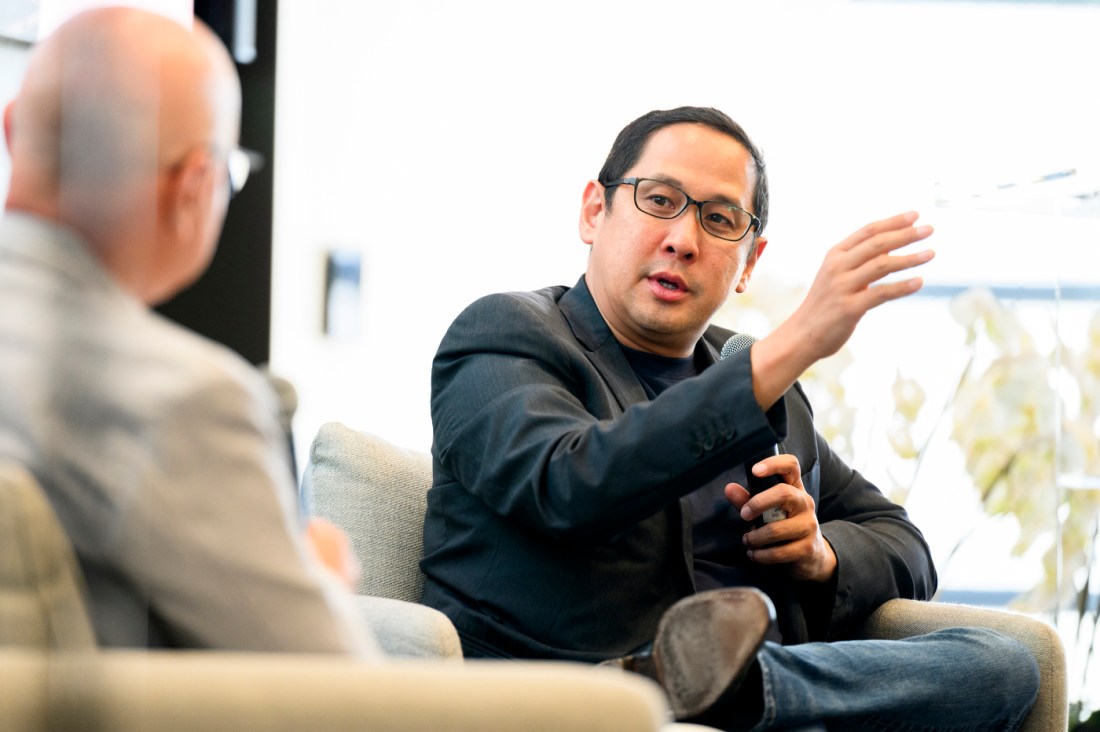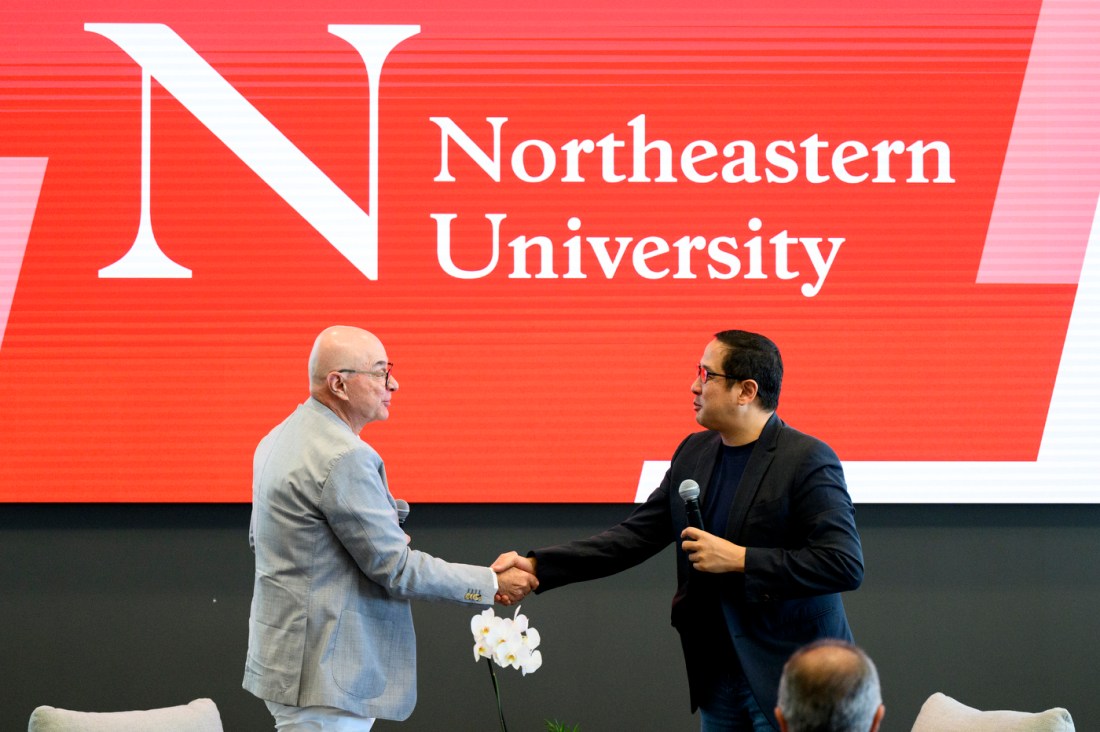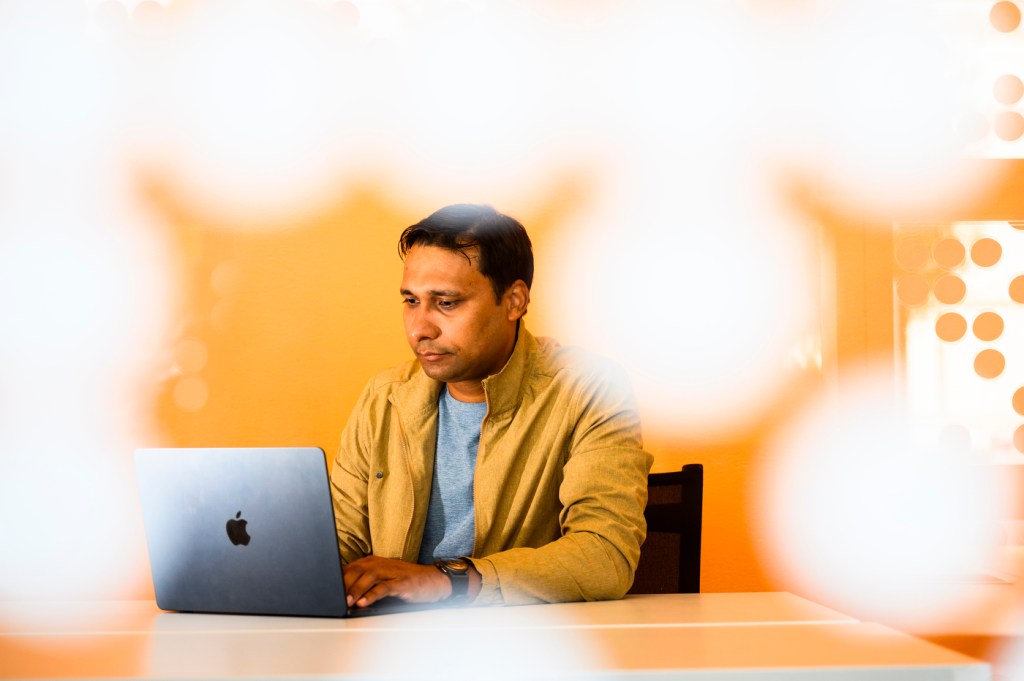In chat with Northeastern President Aoun, graduate and trustee Spencer Fung says companies must ‘rethink constantly,’ establish AI mindset

For nearly 120 years and over four generations of the Fung family, the company Li & Fung Limited has managed global supply chains for retailers and brands.
But the Hong Kong-based company isn’t looking toward the past; it’s focused on the future.
“It’s a very traditional business, and I’m trying to disrupt it,” said Spencer Fung, Li & Fung’s executive group chairman and a Northeastern University trustee and graduate. “I’m trying to create the supply chain of the future.”
Fung was the featured guest at the first Presidential Speakers Series event of the 2025-2026 academic year, chatting with Northeastern President Joseph E. Aoun on Friday afternoon on the eighth floor of the EXP research complex. The series invites accomplished entrepreneurs, academics, social innovators and industry leaders to campus for a conversation with Aoun focused on innovation, entrepreneurship and groundbreaking ideas.
“Every time I meet Spencer, he is thinking about a new way, and testing it and making it happen,” Aoun said in introducing Fung. “He is rethinking constantly — the business, the strategy, the approach — and you’re going to discover many similarities with what we are doing or what we have to do at the university level.”




Li & Fung works primarily with U.S. and European retailers sourcing products like apparel and home merchandise from 40 different countries — navigating tariffs, production capabilities and the availability of raw materials.
But while the business has undoubtedly mastered managing supply chains over its nearly 120 years in business, Fung is focused intently on Li & Fung’s future — a future in which social media dictates fashion and trends that change frequently, where packages arrive at your door within days, and where shopping takes place in cyberspace rather than the local mall.
“We basically say, ‘Let’s not stay here and get disrupted by our competitors or new startups. Let’s try to figure out where the puck is going to be.’ So, we started skating towards the future,” Fung said.
Instead of the traditional “52-week, 300-step” process from ideation to the delivery of apparel, Fung challenged his workers to trim the process down to two weeks, like online retailers.


The company invested in research and development (something Fung said was rare in the shipping industry) by challenging special teams of workers to solve problems and be entrepreneurial. Fung cut red tape for those teams, allowed managers to make individual decisions, and encouraged the teams to move fast, fail fast and function more like a Silicon Valley startup than a 119-year-old company.
“At the heart of that is actually a mindset change,” Fung said. “Once your mindset changes, many things become possible. But your mind — if your mindset is clinging to the old, then you’re just listing a million reasons why it cannot be done.”
And artificial intelligence was, for Li & Fung, ubiquitous.
“AI is everywhere in our company,” Fung said in response to Aoun’s question about the technology.
Editor’s Picks
But Fung also said AI was more a necessity than an advantage.
“Everybody can access AI. It’s cheap, it’s available. So if you’re doing something in AI, you’re probably just catching up. If you’re not using AI, you’re probably falling behind.”
“It’s like somebody saying, I have electricity, you know? Aoun added.
But Fung acknowledged that the transformation of Li & Fung was not necessarily easy.
“In the beginning, we thought that for an old, traditional supply chain, if you digitize it and use data analytics, that it would be the future,” Fung said. “That was a naive sort of initial thinking — if you have an old model, no matter how digitized you make it, it’s still an old model.”
Moreover, the shift is ongoing.
“Eight years ago, we had no idea what the supply chain of the future would look like,” Fung said. “Now we have some clues, some pretty strong clues.”
But at least the shift is coming from within.
“My belief is that every company, every institution, every corporation, will be disrupted one day. You just don’t know when,” Fung said. “So if it’s going to be disrupted one day, why not take a chance to disrupt it yourself, rather than have a competitor eat you up.”











